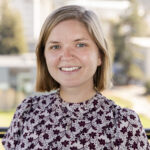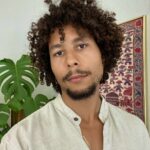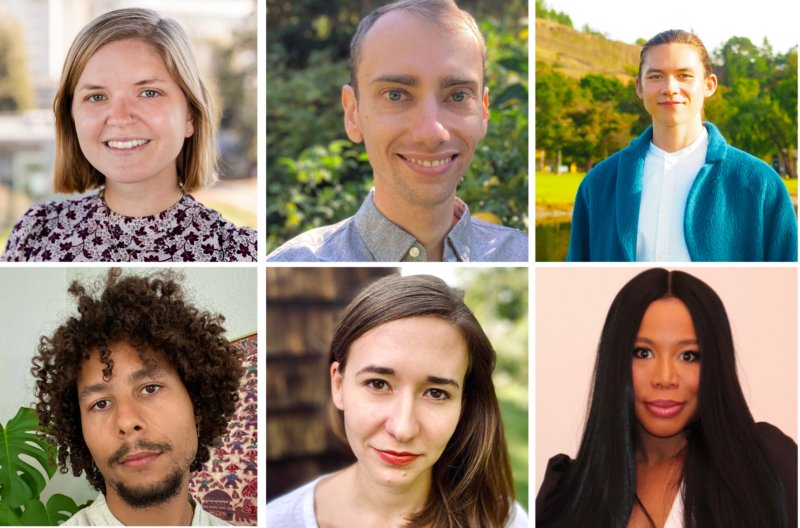Social Science Matrix is proud to announce our inaugural cohort of Matrix Communications Scholars, a group of six UC Berkeley PhD students or candidates who will produce podcasts, articles, and other features showcasing the social sciences at UC Berkeley. Each fellow will also receive a stipend of $1500, and participate in workshops focused on generating communications skills and experience throughout the academic year.
“We are excited to welcome these graduate students as Matrix Communications Scholars,” said Marion Fourcade, Director of Social Science Matrix. “Part of our mission at Matrix is to share UC Berkeley social science with the public in accessible formats. We hope these students will help us reach broader audiences while learning communication skills that will serve them throughout their careers.”
Below are brief biographies for the 2022-2023 Matrix Communications Scholars.
Jennie Barker

Jennie Barker is a PhD candidate in the Department of Political Science studying international relations and comparative politics. Her research examines when and why governments integrate democracy support into their foreign policies. Before coming to UC Berkeley, she was a Research Associate at the National Endowment for Democracy in Washington, D.C. and a Fulbright English Teaching Assistant in Hamburg, Germany. She received my B.A. in political science and German from Tulane University.
J.T. Jamieson

J.T. Jamieson is a PhD candidate in the Department of History. He is interested in social and cultural histories of the early and nineteenth-century United States and is currently finishing his dissertation, “A Mere Change of Location: Migration and Reform in America, 1787-1857.” (Listen to a recent Matrix Podcast interview with J.T. Jamieson here.)
Aidan Lee

Aidan Lee is a PhD student in the Department of History. He is broadly interested in twentieth-century East Asian history, with a particular geographic focus on Taiwan. Through my research, he seeks to understand the connections between urban space, ethnicity, and the evolution of land use for settlement and industry from the Japanese colonial era (1895-1945) to the turn of the twenty-first century. As a member of the Matrix team, he looks forward to sharing some of the exciting cross-disciplinary social science research that is happening at Berkeley, and especially projects that adopt a transnational and comparative lens.
Daniel Lobo

Daniel Lobo is a third-year PhD student in the Department of Sociology and a Computational Social Science Fellow at the Berkeley Institute of Data Science. Building on the theory of Pierre Bourdieu and others, he is interested in three lines of research: (1) identifying and measuring processes of social reproduction in education and the labor market, (2) developing cultural models of upward social mobility that move beyond effects on income, and (3) understanding the causal effects of technological innovation, like platforms and AI, on diversity in cultural producers and in cultural production. Daniel holds a BA in Social Studies from Harvard College. In his spare time, he enjoys hiking, mediation, spending time with family and friends, live concerts in intimate venues, and true crime documentaries.
Nataliya Nedzhvetskaya
 Nataliya Nedzhvetskaya is a PhD student in the Department of Sociology studying economic sociology, organizations, and science and technology. In addition, she holds a Designated Emphasis in the Sociology of Organizations and Markets from Haas School of Business. She studies corporations as sites of broader changes in the economy, with a particular interest in understanding the tensions between shareholder value and stakeholder capitalism. Her dissertation studies employee activism (workplace protests) in U.S. corporations over the last five decades.
Nataliya Nedzhvetskaya is a PhD student in the Department of Sociology studying economic sociology, organizations, and science and technology. In addition, she holds a Designated Emphasis in the Sociology of Organizations and Markets from Haas School of Business. She studies corporations as sites of broader changes in the economy, with a particular interest in understanding the tensions between shareholder value and stakeholder capitalism. Her dissertation studies employee activism (workplace protests) in U.S. corporations over the last five decades.
Tiffany Taylor

Tiffany Taylor is a doctoral student in the department of anthropology. Previously, she received a Master of Public Health in Epidemiology from Columbia University and a Master of Science in Systems Biology and Bioinformatics from New York University. She graduated as a triple major and as a Student Marshal from the University of Chicago with undergraduate majors in Political Science, Sociology, and Comparative Race and Ethnic Studies. Her research focuses on politics and political anthropology, the open internet, democracy, technology policy, governmentality, international studies, and mass surveillance in marginalized communities.



